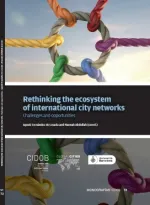City diplomacy in the postmodern era: Networks flourish, territories wither?

International relations today differ greatly from those that have dominated the global scene since the Treaty of Westphalia was signed in 1648 and an international regime was established with the nation-state at its centre.
Since the end of the 20th century, globalisation has been eroding the nation-state’s position as the political unit of reference, along with one of its fundamental attributes: sovereignty. For centuries, sovereignty has been the foundation of many of the state’s political functions, such as participation in international relations. As a result of this crisis of the nation-state (Castells, 2003), the global scene has become fragmented, facilitating the emergence of other actors that have come to play increasingly important roles in global governance. It is in this context that cities are becoming new actors in international relations (Oosterlynck et al., 2019), especially once they join transnational networks and platforms in order to operate internationally.